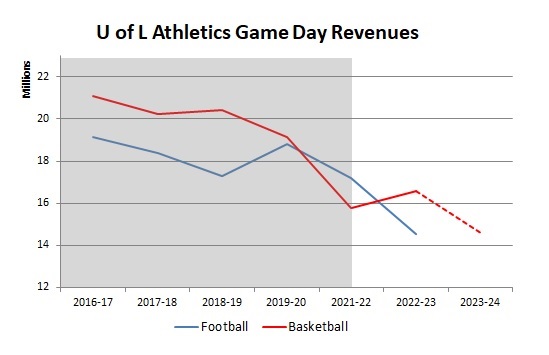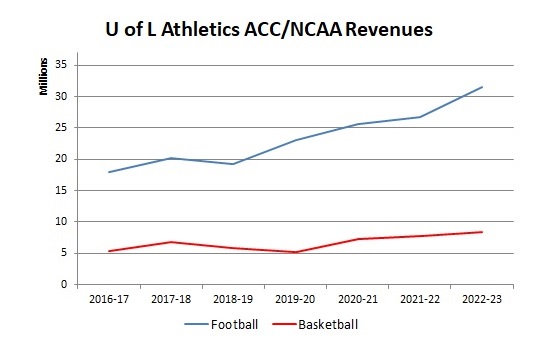Very few people anymore are willing to take up the argument that Kenny Payne is or ever will be a good basketball coach. All of the geniuses now fighting for the same microphone—the latest being Bill Lamb (the former station manager of WDRB-TV)—are getting downright laughable. Leave it to something perceived as obvious to bring everyone to the party.
But due to U of L’s judicious timing last week in sync with a ULAA Finance & Budget meeting, Payne is also getting unfairly torched for his department’s finances.
U of L knew what it was doing on Friday. They knew their numbers at the midpoint of fiscal year 2024 were going to miss the budget—yet again—so Josh Heird & Co. seized that opportunity to talk about how poorly men’s basketball was performing.
The much more complex issue facing U of L is that men’s basketball operations didn’t just start having financial problems in March 2022 when Payne was hired to be the new head coach. No, U of L had a big jump on that dumpster fire, something Payne probably walked into optimistically and unaware of.
For that information, you need to dig a little deeper than an annual report which is something of a black box when you’re looking for answers. A compendium of financial reports that have been obtained through many open records requests to the University paints a far different story than the one U of L wants to tell.
A ULAA annual report doesn’t list the cash flows that coincide with a team’s performance on the court, that are a function of attendance. Ticket and premium seat sales, suite rentals, parking and concessions are the operating revenues that the men’s basketball coach can directly affect. Collectively, these make up “game day revenues” (GDRs) and are a far more accurate indicator than, for example, conference revenue distributions that have become a huge contributor to athletic department finances.
I’ve compiled GDRs dating back to the exit of Rick Pitino, Tom Jurich, and the senior athletics staff in place in late 2017. Here are the numbers for the two primary revenue sports, football and men’s basketball, spanning multiple years. The Covid year of 2020-2021 is omitted…
 We were told on Friday about a $2 million revenue shortfall in men’s basketball, but thus far, I haven’t received a number or a reference point from which the decline occurred. I’ve temporarily added it as the dotted line on the basketball plot. The gray area is the time prior to Kenny Payne’s arrival.
We were told on Friday about a $2 million revenue shortfall in men’s basketball, but thus far, I haven’t received a number or a reference point from which the decline occurred. I’ve temporarily added it as the dotted line on the basketball plot. The gray area is the time prior to Kenny Payne’s arrival.
Over the five years preceding Payne, GDR for men’s basketball had declined from $21.1 million annually to $15.8 million, a drop of 25%. These revenues actually increased in Payne’s first season (2022-23) to $16.6 million. I’ll find out if I get sufficient data whether that 2024 number is expected to be around $14.6 million.
[And therein lies a big problem… As of July 1, 2023, U of L has a new sheriff in charge of finances, Nick Bowes, who has “streamlined” their operations. Included is apparently LESS reporting internally on their finances. They claim to no longer be preparing basic financial statements on a periodic basis like a balance sheet and income statement, nor are they summarizing corresponding reports on the department’s operating areas against the budget. It’s strange how an operation that has almost no liquidity or liquid net position is justified in shutting down the flow of financial info.]
Why this poor performance in the two major sports hasn’t surfaced until now is best understood by looking at what is today the most significant single revenue stream in U of L athletics...

Because U of L gets so much revenue from the ACC and its media partners, it’s almost impossible to look at a ULAA annual report anymore and tell how the core operating areas are performing. A $4.5 million GDR decline in basketball between 2017 and 2023 is almost entirely offset by a $3.0 million increase in conference revenue. And even more striking is a slightly larger $4.6 million GDR decline on the football side getting absolutely swamped by a corresponding $13.6 million increase in ACC football revenue.
There’s almost no chance that attendance problems, especially in football, are going to reduce ULAA revenues year over year. ACC corporate welfare sees to that. What that can mask is what it’s masking at U of L.
Kenny Payne is not the financial disaster that some are making him out to be and that U of L will tacitly allow to happen. The reason for that is most of us simply don’t have good information, at least not anymore. And U of L is motivated to restrict it, because the financial disaster started in 2017 and has intensified across both of the major revenue sports. A struggling, late-to-the-party basketball coach is hardly accountable for that…
But due to U of L’s judicious timing last week in sync with a ULAA Finance & Budget meeting, Payne is also getting unfairly torched for his department’s finances.
U of L knew what it was doing on Friday. They knew their numbers at the midpoint of fiscal year 2024 were going to miss the budget—yet again—so Josh Heird & Co. seized that opportunity to talk about how poorly men’s basketball was performing.
The much more complex issue facing U of L is that men’s basketball operations didn’t just start having financial problems in March 2022 when Payne was hired to be the new head coach. No, U of L had a big jump on that dumpster fire, something Payne probably walked into optimistically and unaware of.
For that information, you need to dig a little deeper than an annual report which is something of a black box when you’re looking for answers. A compendium of financial reports that have been obtained through many open records requests to the University paints a far different story than the one U of L wants to tell.
A ULAA annual report doesn’t list the cash flows that coincide with a team’s performance on the court, that are a function of attendance. Ticket and premium seat sales, suite rentals, parking and concessions are the operating revenues that the men’s basketball coach can directly affect. Collectively, these make up “game day revenues” (GDRs) and are a far more accurate indicator than, for example, conference revenue distributions that have become a huge contributor to athletic department finances.
I’ve compiled GDRs dating back to the exit of Rick Pitino, Tom Jurich, and the senior athletics staff in place in late 2017. Here are the numbers for the two primary revenue sports, football and men’s basketball, spanning multiple years. The Covid year of 2020-2021 is omitted…

Over the five years preceding Payne, GDR for men’s basketball had declined from $21.1 million annually to $15.8 million, a drop of 25%. These revenues actually increased in Payne’s first season (2022-23) to $16.6 million. I’ll find out if I get sufficient data whether that 2024 number is expected to be around $14.6 million.
[And therein lies a big problem… As of July 1, 2023, U of L has a new sheriff in charge of finances, Nick Bowes, who has “streamlined” their operations. Included is apparently LESS reporting internally on their finances. They claim to no longer be preparing basic financial statements on a periodic basis like a balance sheet and income statement, nor are they summarizing corresponding reports on the department’s operating areas against the budget. It’s strange how an operation that has almost no liquidity or liquid net position is justified in shutting down the flow of financial info.]
Why this poor performance in the two major sports hasn’t surfaced until now is best understood by looking at what is today the most significant single revenue stream in U of L athletics...

Because U of L gets so much revenue from the ACC and its media partners, it’s almost impossible to look at a ULAA annual report anymore and tell how the core operating areas are performing. A $4.5 million GDR decline in basketball between 2017 and 2023 is almost entirely offset by a $3.0 million increase in conference revenue. And even more striking is a slightly larger $4.6 million GDR decline on the football side getting absolutely swamped by a corresponding $13.6 million increase in ACC football revenue.
There’s almost no chance that attendance problems, especially in football, are going to reduce ULAA revenues year over year. ACC corporate welfare sees to that. What that can mask is what it’s masking at U of L.
Kenny Payne is not the financial disaster that some are making him out to be and that U of L will tacitly allow to happen. The reason for that is most of us simply don’t have good information, at least not anymore. And U of L is motivated to restrict it, because the financial disaster started in 2017 and has intensified across both of the major revenue sports. A struggling, late-to-the-party basketball coach is hardly accountable for that…
Last edited:
